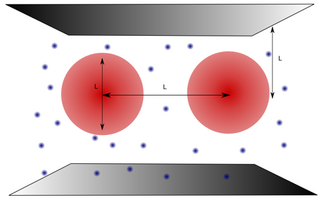Difference between revisions of "Electrohydrodynamics"
| Line 3: | Line 3: | ||
Using {{ES}} we are investigating many different systems, especially in confined geometries, like the transport properties of ionic solutions in nanopores during DNA translocation, electro-osmotic flow in slit pores and properties of suspensions of confined charged colloids, in particular in slit and cylindrical pores. | Using {{ES}} we are investigating many different systems, especially in confined geometries, like the transport properties of ionic solutions in nanopores during DNA translocation, electro-osmotic flow in slit pores and properties of suspensions of confined charged colloids, in particular in slit and cylindrical pores. | ||
| − | [[Image:Colloids.png| | + | [[Image:Colloids.png|320px]] |
The physics of these systems is particularly intriguing and it is still not clear whether deviations from the canonical Poisson-Boltzmann treatment have to be invoked in order to correctly address the problem. | The physics of these systems is particularly intriguing and it is still not clear whether deviations from the canonical Poisson-Boltzmann treatment have to be invoked in order to correctly address the problem. | ||
Revision as of 17:23, 22 October 2010
Many new and exciting physical phenomena occur in charged systems in solution, where the interplay between the hydrodynamic forces and the electrostatic interaction plays an important role in determining the dynamical properties.
Using ESPResSo we are investigating many different systems, especially in confined geometries, like the transport properties of ionic solutions in nanopores during DNA translocation, electro-osmotic flow in slit pores and properties of suspensions of confined charged colloids, in particular in slit and cylindrical pores.
The physics of these systems is particularly intriguing and it is still not clear whether deviations from the canonical Poisson-Boltzmann treatment have to be invoked in order to correctly address the problem.
